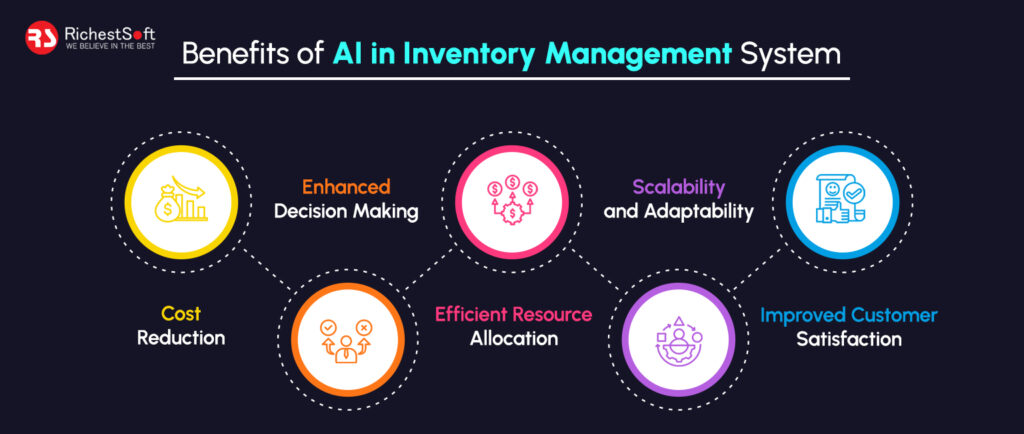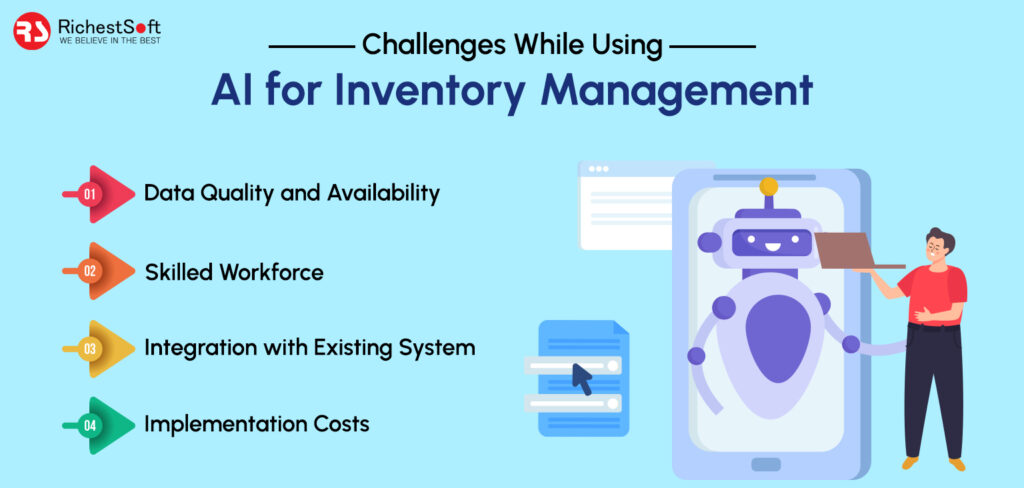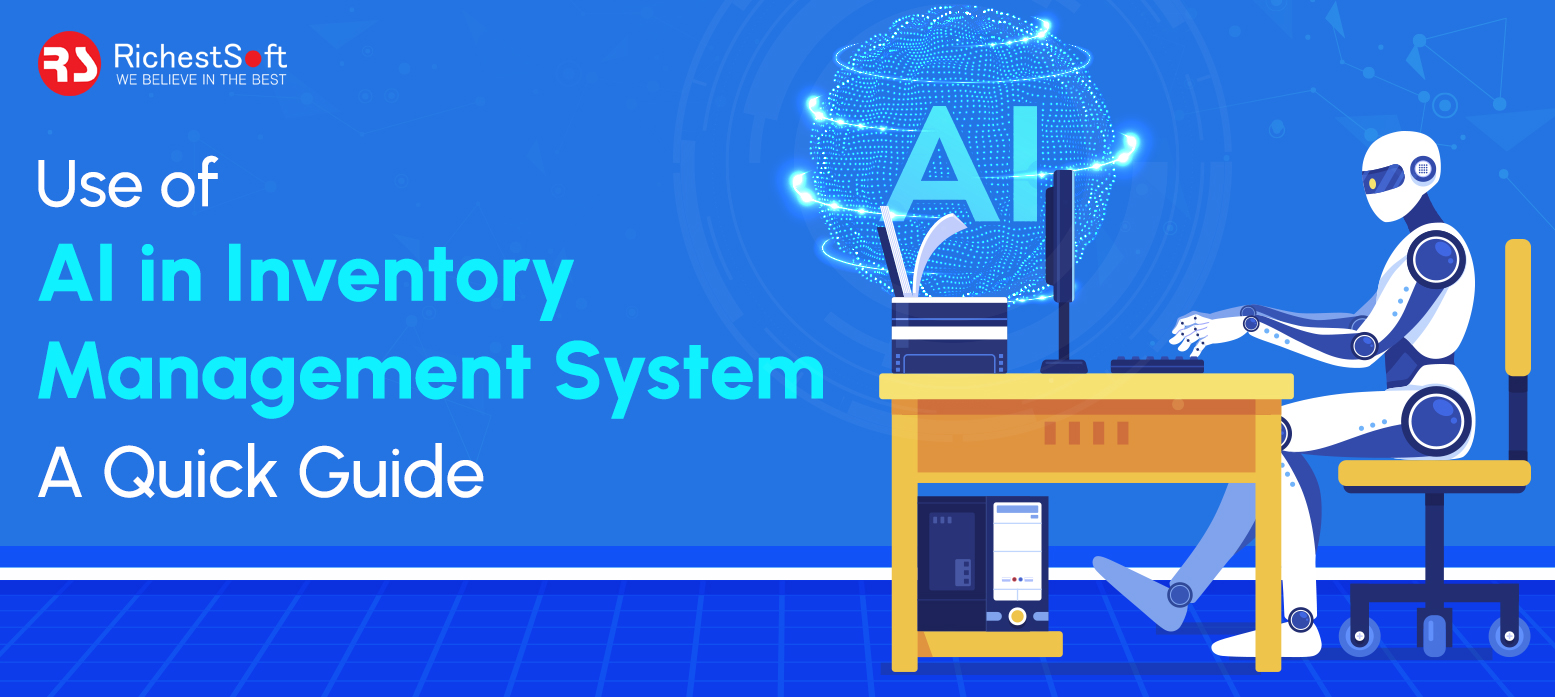October 17, 2024
In today’s fast-paced world of product engineering services, inventory management has evolved into a complex puzzle. Companies boost their reach and cater to a worldwide audience by tracking inventory and maintaining real-time status.
Inventory management is the process of ordering, storing, and using a company’s inventory. This keeps the cost in check and has become a high-stakes game where every piece of inventory fits perfectly.
AI helps improve many areas of inventory management, ranging from real-time data analysis to automated decision-making. It can easily process a large amount of data quickly, accurately, and without fatigue, making it a valuable means for optimizing inventory.
There is a thin disparity between having enough inventory to keep operations smooth and efficient and sidestepping extra stocks. In this blog, we will walk through the use of AI in inventory management system.

How is AI Revolutionizing in Inventory Management System?
Artificial Intelligence has played a crucial role in transforming inventory management. This has leveraged advanced algorithms and ML techniques to analyze vast datasets quickly and accurately.
AI-powered systems can process data at an exceptional scale and speed, unlike traditional techniques that rely on manual inputs and analysis. Using AI for inventory management system lies in its ability to detect designs and trends within data.
This allows businesses to understand their inventory needs better, optimize stock levels, and anticipate changes in demand.
Moreover, AI signifies the ability to perform predictive analytics by indicating forthcoming needs through analytics and current market stats.
Furthermore, an AI-powered inventory management system can continually learn and adapt. This adaptive ability enables businesses to stay elegant and responsive in an increasingly competitive marketplace.
Get in touch with RichestSoft and maximize your business potential with a custom AI development company. Our progressive technology helps you to excel in a fine-turning foundation.
How Does AI in Inventory Management System Work?
The use of AI in inventory surveillance systems affects different components that streamline data analysis, generate insight, and help in decision-making.
It goes beyond traditional inventory management practice by integrating a powerful LLM (Large Language Model).
This also connects them with an organization’s unique data sources. With this approach, businesses can unlock a new level of insight generation and authorize businesses to build data-driven decisions in real-time.
This leverages several components to streamline the inventory management process. It provides a detailed overview of how AI facilitates inventory regimes, leveraging various data sources and technologies.
Moreover, this approach enables enterprises to manage their inventory more virtually, decreasing costs, optimizing stock levels, and providing convenient order fulfillment.
Benefits of AI in Inventory Management System
Implementing AI in inventory management brings many advantages that enhance the efficiency of operations and greatly impact businesses’ bottom line.

Here is a list of some common benefits of using AI for inventory management.
1. Cost Reduction
One of the most influential reasons businesses adopt AI in inventory management is the potential for significant cost reduction. AI-driven inventory optimization minimizes carrying costs by ensuring businesses stock the right products.
Overstocking and stockout are costly problems that AI can help to eliminate. It is good to optimize inventory levels, let companies allocate resources more efficiently, reduce storage costs, and improve profitability.
2. Enhanced Decision Making
AI-powered systems process and analyze copious amounts of data in real time, providing valuable insights and recommendations. Businesses can produce advised judgments based on the following insights.
- Optimizing record points
- Adjusting pricing strategies
- Managing supplier relationships
3. Improved Customer Satisfaction
In the era of instant gratification fueled by Amazon Prime’s guaranteed one-day shipping and an endless stream of funny cat videos on Instagram. Customers anticipate products to be available instantly when they want them.
Using AI in inventory management system ensures this is the case. Real demand forecasting and real-time monitoring of lower out-of-stock samples, stopping customers from shifting to competitors and maintaining brand loyalty.
4. Scalability and Adaptability
Using AI for inventory management can scale with business growth. Procedures can develop, and AI can adjust to changing demand patterns and new products.
These systems’ flexibility ensures that they remain relevant and effective, whether a business operates on a small scale or a global enterprise.
5. Efficient Resource Allocation
AI’s ability to automate regular inventory tasks, such as order placement and reordering, allows businesses to assign their human resources more efficiently.
This allows employees to focus on strategic activities, such as supplier negotiations, marketing, and customer services, while AI handles everyday operations.
We offer AI chatbot development for your business, enabling you to build a more engaging business. Let us help you to bring your business to new heights.
7 Use of AI in Inventory Management System
Artificial Intelligence has numerous use cases in inventory management. It provides companies with effective and robust tools to optimize their supply chain and enhance overall efficiency.
Below, we have listed some of the key use of AI in inventory management system.
1. Demand Forecasting
AI in inventory control leverages worldly algorithms to meticulously examine diverse data points, including old sales data, market data, market trends, external influence, and promotional activities.
This analysis defines complicated patterns and correlations, encouraging businesses to develop demand forecasts.
This protective approach empowers businesses to meet customer demand effectively while reducing costs excessively.
2. Inventory Optimization
Using AI for inventory management evaluates multiple elements, such as lead times, demand visibility, and storage costs.
Using sophisticated optimization procedures, AI guarantees companies preserve acceptable stocks to fulfill demand while underestimating excess inventory and related holding expenses.
This allows businesses to manage inventory more efficiently without unnecessary costs or shortages.
3. Recording
Artificial intelligence automates the process of generating purchase orders or replenishment requests. This dynamically modifies record points and order quantities using need forecasts and pre-defined inventory policies.
Businesses can optimize inventory levels and minimize stocks through these adaptive AI capabilities, enhancing overall operational costs.
4. Demand Prediction
Predictive analysis is an important tool for understanding customer demands. It combines old sales data, real-time information, and market trends to view the demand pattern comprehensively.
AI-driven predictive analysis can help businesses anticipate instabilities in need and react proactively by accommodating inventory levels, production programs, or supply chain operations.
5. Result Management
With AI, businesses can examine return patterns and reasons to streamline return processing, pinpointing trends in product defects, customer preferences, and supply chain inefficiencies.
By automating return processing and restocking decisions, AI reduces the impact of returns on inventory levels and optimizes recovery routine.
This enables businesses to manage returns efficiently, enhance customer satisfaction, and improve inventory management practices.
6. Seasonal Trend Analysis
Using AI in business, you can analyze seasonal trends and patterns in inventory sales to optimize stock levels, promotions, and marketing strategies.
This proactive approach helps businesses sidestep stock outs during peak seasons while minimizing overstocking during the off-season.
Moreover, AI-driven wisdom advises targeted advancements and marketing campaigns tailored to distinct seasonal trends, maximizing revenue possibility and enhancing overall profitability.
7. Inventory Auditing
Using AI for inventory management system is also beneficial to conduct audits to minimize manual labor and enhance accuracy.
With advanced vision and machine learning algorithms, these drones navigate the inventory space efficiently, capturing and analyzing real-time data.
AI-driven inventory audits enhance functional efficiency, optimize inventory management, and support better business decision-making.
Challenges While Using AI in Inventory Management System
Embracing artificial intelligence in mobile app or inventory management offers more benefits. However, it is more important to acknowledge the associated challenges.

Understanding these aspects is critical for businesses that want to integrate AI into their inventory management strategy. Here are a few challenges that occur while using AI for inventory management.
⏩ Data Quality and Availability
Artificial intelligence systems heavily rely on data. Inaccurate, incomplete, or outdated data can lead to predictions and suboptimal decision-making.
Data quality is a challenge companies must address, often requiring data cleansing, integration, and consistent updates. Moreover, some businesses may lack the old data needed for true-to-life AI-driven forecasting.
⏩ Skilled Workforce
Successful implementation of AI in inventory management system is often a necessity for the workforce.
Data scientists, machine learning makers, and AI professionals are in increased market. Recruiting or upskilling existing employees can be challenging for some businesses.
⏩ Integration with Existing System
Many businesses already have established inventory management systems.
Integrating AI solutions in existing apps with these legacy systems can be complex and require custom development. This ensures a seamless connection between AI and existing processes, which is paramount.
⏩ Implementation Costs
The implication of AI solutions can be a substantial investment. The costs estimation of inventory management software include acquiring the required hardware and software and training the workforce to use and maintain the system.
Small businesses may incur these costs, although additional cloud-based AI keys are now available.
To get AI Integration Services with cutting-edge technology, contact RichestSoft. Our expert team will help you bring your imagination into existence
Sum up
AI has greatly affected inventory management, empowering businesses with exceptional efficiency, accuracy, and foresight. It manages long-standing difficulties and opens unparalleled possibilities for optimization.
Undoubtedly, this guide will help you familiarize yourself with AI’s use in inventory management system.
By choosing RichestSoft, you are investing in your inventory management. If you are new in the AI industry, then don’t get Upset. We also offer AI marketing services for startups.

 +1 315 210 4488
+1 315 210 4488 +91 99888 06489
+91 99888 06489






